- Home
- Salman Rushdie
Midnight's Children Page 23
Midnight's Children Read online
Page 23
Years later, in Pakistan, on the very night when the roof was to fall in on her head and squash her flatter than a rice-pancake, Amina Sinai saw the old washing-chest in a vision. When it popped up inside her eyelids, she greeted it like a not-particularly-welcome cousin. “So it’s you again,” she told it, “Well, why not? Things keep coming back to me these days. Seems you just can’t leave anything behind.” She had grown prematurely old like all the women in our family; the chest reminded her of the year in which old age had first begun creeping up on her. The great heat of 1956—which Mary Pereira told me was caused by little blazing invisible insects—buzzed in her ears once again. “My corns began killing me then,” she said aloud, and the Civil Defense official who had called to enforce the blackout smiled sadly to himself and thought, Old people shroud themselves in the past during a war, that way they’re ready to die whenever required. He crept away past the mountains of defective terry towels which filled most of the house, and left Amina to discuss her dirty laundry in private … Nussie Ibrahim—Nussie-the-duck—used to admire Amina: “Such posture, my dear, that you’ve got! Such tone! I swear it’s a wonder to me: you glide about like you’re on an invisible trolley!” But in the summer of the heat insects, my elegant mother finally lost her battle against verrucas, because the sadhu Purushottam suddenly lost his magic. Water had worn a bald patch in his hair; the steady dripping of the years had worn him down. Was he disillusioned with his blessed child, his Mubarak? Was it my fault that his mantras lost their power? With an air of great trouble, he told my mother, “Never mind; wait only; I’ll fix your feet for sure.” But Amina’s corns grew worse; she went to doctors who froze them with carbon dioxide at absolute zero; but that only brought them back with redoubled vigor, so that she began to hobble, her gliding days done for ever; and she recognized the unmistakable greeting of old age. (Chock-full of fantasy, I transformed her into a silkie—“Amma, maybe you’re a mermaid really, taking human form for the love of a man—so every step is like walking on razor blades!” My mother smiled, but did not laugh.)
1956. Ahmed Sinai and Doctor Narlikar played chess and argued—my father was a bitter opponent of Nasser, while Narlikar admired him openly. “The man is bad for business,” Ahmed said: “But he’s got style,” Narlikar responded, glowing passionately, “Nobody pushes him around.” At the same time, Jawaharlal Nehru was consulting astrologers about the country’s Five Year Plan, in order to avoid another Karamstan; and while the world combined aggression and the occult, I lay concealed in a washing-chest which wasn’t really big enough for comfort any more; and Amina Sinai became filled with guilt.
She was already trying to put out of her mind her adventure at the racetrack; but the sense of sin which her mother’s cooking had given her could not be escaped; so it was not difficult for her to think of the verrucas as a punishment … not only for the years-ago escapade at Mahalaxmi, but for failing to save her husband from the pink chitties of alcoholism; for the Brass Monkey’s untamed, unfeminine ways; and for the size of her only son’s nose. Looking back at her now, it seems to me that a fog of guilt had begun to form around her head—her black skin exuding black clouds which hung before her eyes. (Padma would believe it; Padma would know what I mean!) And as her guilt grew, the fog thickened—yes, why not?—there were days when you could hardly see her head above her neck! … Amina had become one of those rare people who take the burdens of the world upon their own backs; she began to exude the magnetism of the willingly guilty; and from then on everyone who came into contact with her felt the most powerful of urges to confess their own, private guilts. When they succumbed to my mother’s powers, she would smile at them with a sweet sad foggy smile and they would go away, lightened, leaving their burdens on her shoulders; and the fog of guilt thickened. Amina heard about servants being beaten and officials being bribed; when my uncle Hanif and his wife the divine Pia came to call they related their quarrels in minute detail; Lila Sabarmati confided her infidelities to my mother’s graceful, inclined, long-suffering ear; and Mary Pereira had to fight constantly against the almost-irresistible temptation to confess her crime.
Faced with the guilts of the world, my mother smiled foggily and shut her eyes tight; and by the time the roof fell in on her head her eyesight was badly impaired; but she could still see the washing-chest.
What was really at the bottom of my mother’s guilt? I mean really, beneath verrucas and djinns and confessions? It was an unspeakable malaise, an affliction which could not even be named, and which no longer confined itself to dreams of an underworld husband … my mother had fallen (as my father would soon fall) under the spell of the telephone.
* * *
In the afternoons of that summer, afternoons as hot as towels, the telephone would ring. When Ahmed Sinai was asleep in his room, with his keys under his pillow and umbilical cords in his almirah, telephonic shrilling penetrated the buzzing of the heat insects; and my mother, verruca-hobbled, came into the hall to answer. And now, what expression is this, staining her face the color of drying blood? … Not knowing that she’s being observed, what fish-like flutterings of lips are these, what strangulated mouthings? … And why, after listening for a full five minutes, does my mother say, in a voice like broken glass, “Sorry: wrong number”? Why are diamonds glistening on her eyelids? … The Brass Monkey whispered to me, “Next time it rings, let’s find out.”
Five days later. Once more it is afternoon; but today Amina is away, visiting Nussie-the-duck, when the telephone demands attention. “Quick! Quick or it’ll wake him!” The Monkey, agile as her name, picks up the receiver before Ahmed Sinai has even changed the pattern of his snoring … “Hullo? Yaas? This is seven zero five six one; hullo?” We listen, every nerve on edge; but for a moment there is nothing at all. Then, when we’re about to give up, the voice comes. “… Oh … yes … hullo …” And the Monkey, shouting almost, “Hullo? Who is it, please?” Silence again; the voice, which has not been able to prevent itself from speaking, considers its answer; and then, “… Hullo … This is Shanti Prasad Truck Hire Company, please? …” And the Monkey, quick as a flash: “Yes, what d’you want?” Another pause; the voice, sounding embarrassed, apologetic almost, says, “I want to rent a truck.”
O feeble excuse of telephonic voice! O transparent flummery of ghosts! The voice on the phone was no truck-renter’s voice; it was soft, a little fleshly, the voice of a poet … but after that, the telephone rang regularly; sometimes my mother answered it, listened in silence while her mouth made fish-motions, and finally, much too late, said, “Sorry, wrong number”; at other times the Monkey and I clustered around it, two ears to ear-piece, while the Monkey took orders for trucks. I wondered: “Hey, Monkey, what d’you think? Doesn’t the guy ever wonder why the trucks don’t arrive?” And she, wide-eyed, flutter-voiced: “Man, do you suppose … maybe they do!”
But I couldn’t see how; and a tiny seed of suspicion was planted in me, a tiny glimmering of a notion that our mother might have a secret—our Amma! Who always said, “Keep secrets and they’ll go bad inside you; don’t tell things and they’ll give you stomach-ache!”—a minute spark which my experience in the washing-chest would fan into a forest fire. (Because this time, you see, she gave me proof.)
And now, at last, it is time for dirty laundry. Mary Pereira was fond of telling me, “If you want to be a big man, baba, you must be very clean. Change clothes,” she advised, “take regular baths. Go, baba, or I’ll send you to the washerman and he’ll wallop you on his stone.” She also threatened me with bugs: “All right, stay filthy, you will be nobody’s darling except the flies’. They will sit on you while you sleep; eggs they’ll lay under your skin!” In part, my choice of hiding-place was an act of defiance. Braving dhobis and houseflies, I concealed myself in the unclean place; I drew strength and comfort from sheets and towels; my nose ran freely into the stone-doomed linens; and always, when I emerged into the world from my wooden whale, the sad mature wisdom of dirty washing lingered wit
h me, teaching me its philosophy of coolness and dignity-despite-everything and the terrible inevitability of soap.
One afternoon in June, I tiptoed down the corridors of the sleeping house towards my chosen refuge; sneaked past my sleeping mother into the white-tiled silence of her bathroom; lifted the lid off my goal; and plunged into its soft continuum of (predominantly white) textiles, whose only memories were of my earlier visits. Sighing softly, I pulled down the lid, and allowed pants and vests to massage away the pains of being alive, purposeless and nearly nine years old.
Electricity in the air. Heat, buzzing like bees. A mantle, hanging somewhere in the sky, waiting to fall gently around my shoulders … somewhere, a finger reaches towards a dial; a dial whirs around and around, electrical pulses dart along cable, seven, zero, five, six, one. The telephone rings. Muffled shrilling of a bell penetrates the washing-chest, in which a nearlynineyearold boy lies uncomfortably concealed … I, Saleem, became stiff with the fear of discovery, because now more noises entered the chest; squeak of bedsprings; soft clatter of slippers along corridor; the telephone, silenced in mid-shrill; and—or is this imagination? Was her voice too soft to hear?—the words, spoken too late as usual: “Sorry. Wrong number.”
And now, hobbling footsteps returning to the bedroom; and the worst fears of the hiding boy are fulfilled. Doorknobs, turning, scream warnings at him; razor-sharp steps cut him deeply as they move across cool white tiles. He stays frozen as ice, still as a stick; his nose drips silently into dirty clothes, a pajama-cord—snake-like harbinger of doom!—inserts itself into his left nostril. To sniff would be to die: he refuses to think about it.
… Clamped tight in the grip of terror, he finds his eye looking through a chink in dirty washing … and sees a woman crying in a bathroom. Rain dropping from a thick black cloud. And now more sound, more motion: his mother’s voice has begun to speak, two syllables, over and over again; and her hands have begun to move. Ears muffled by underwear strain to catch the sounds—that one: dir? Bir? Dil?—and the other: Ha? Ra? No—Na. Ha and Ra are banished; Dil and Bir vanish forever; and the boy hears, in his ears, a name which has not been spoken since Mumtaz Aziz became Amina Sinai: Nadir. Nadir. Na. Dir. Na.
And her hands are moving. Lost in their memory of other days, of what happened after games of hit-the-spittoon in an Agra cellar, they flutter gladly at her cheeks; they hold her bosom tighter than any brassieres; and now they caress her bare midriff, they stray below decks … yes, this is what we used to do, my love, it was enough, enough for me, even though my father made us, and you ran, and now the telephone, Nadirnadirnadirnadirnadirnadir … hands which held telephone now hold flesh, while in another place what does another hand do? To what, after replacing receiver, is another hand getting up? … No matter; because here, in her spied-out privacy, Amina Sinai repeats an ancient name, again and again, until finally she bursts out with, “Arré Nadir Khan, where have you come from now?”
Secrets. A man’s name. Never-before-glimpsed motions of the hands. A boy’s mind filled with thoughts which have no shape, tormented by ideas which refuse to settle into words; and in a left nostril, a pajama-cord is snaking up up up, refusing to be ignored …
And now—O shameless mother! Revealer of duplicity, of emotions which have no place in family life; and more: O brazen unveiler of Black Mango!—Amina Sinai, drying her eyes, is summoned by a more trivial necessity; and as her son’s right eye peers out through the wooden slats at the top of the washing-chest, my mother unwinds her sari! While I, silently in the washing-chest: “Don’t do it don’t do it don’t do!” … but I cannot close my eye. Unblinking pupil takes in upside-down image of sari falling to the floor, an image which is, as usual, inverted by the mind; through ice-blue eyes I see a slip follow the sari; and then—O horrible!—my mother, framed in laundry and slatted wood, bends over to pick up her clothes! And there it is, searing my retina—the vision of my mother’s rump, black as night, rounded and curved, resembling nothing on earth so much as a gigantic, black Alfonso mango! In the washing-chest, unnerved by the vision, I wrestle with myself … self-control becomes simultaneously imperative and impossible … under the thunderclap influence of the Black Mango, my nerve cracks; pajama-cord wins its victory; and while Amina Sinai seats herself on a commode, I … what? Not sneeze; it was less than a sneeze. Not a twitch, either; it was more than that. It’s time to talk plainly: shattered by two-syllabic voice and fluttering hands, devastated by Black Mango, the nose of Saleem Sinai, responding to the evidence of maternal duplicity, quivering at the presence of maternal rump, gave way to a pajama-cord and was possessed by a cataclysmic—a world-altering—an irreversible sniff. Pajama-cord rises painfully half an inch further up the nostril. But other things are rising, too: hauled by that feverish inhalation, nasal liquids are being sucked relentlessly up up up, nose-goo flowing upwards, against gravity, against nature. Sinuses are subjected to unbearable pressure … until, inside the nearlynineyearold head, something bursts. Snot rockets through a breached dam into dark new channels. Mucus, rising higher than mucus was ever intended to rise, Waste fluid, reaching as far, perhaps, as the frontiers of the brain … there is a shock. Something electrical has been moistened.
Pain.
And then noise, deafening manytongued terrifying, inside his head! … Inside a white wooden washing-chest, within the darkened auditorium of my skull, my nose began to sing.
But just now there isn’t time to listen; because one voice is very close indeed. Amina Sinai has opened the lower door of the washing-chest; I am tumbling downdown with laundry wrapped around my head like a caul. Pajama-cord jerks out of my nose; and now there is lightning flashing through the dark clouds around my mother—and a refuge has been lost for ever.
“I didn’t look!” I squealed up through socks and sheets. “I didn’t see one thing, Ammi, I swear!!”
And years later, in a cane chair among reject towels and a radio announcing exaggerated war victories, Amina would remember how with thumb and forefinger around the ear of her lying son she led him to Mary Pereira, who was sleeping as usual on a cane mat in a sky-blue room; how she said, “This young donkey; this good-for-nothing from nowhere is not to speak for one whole day.” … And, just before the roof fell in on her, she said aloud: “It was my fault. I brought him up too badly.” As the explosion of the bomb ripped through the air, she added, mildly but firmly, addressing her last words on earth to the ghost of a washing-chest: “Go away now. I’ve seen enough of you.”
On Mount Sinai, the prophet Musa or Moses heard disembodied commandments; on Mount Hira, the prophet Muhammad (also known as Mohammed, Mahomet, the Last-But-One, and Mahound) spoke to the Archangel. (Gabriel or Jibreel, as you please.) And on the stage of the Cathedral and John Connon Boys’ High School, run “under the auspices” of the Anglo-Scottish Education Society, my friend Cyrus-the-great, playing a female part as usual, heard the voices of St. Joan speaking the sentences of Bernard Shaw. But Cyrus is the odd one out: unlike Joan, whose voices were heard in a field, but like Musa or Moses, like Muhammad the Penultimate, I heard voices on a hill.
Muhammad (on whose name be peace, let me add; I don’t want to offend anyone) heard a voice saying, “Recite!” and thought he was going mad; I heard, at first, a headful of gabbling tongues, like an untuned radio; and with lips sealed by maternal command, I was unable to ask for comfort. Muhammad, at forty, sought and received reassurance from wife and friends: “Verily,” they told him, “you are the Messenger of God”; I, suffering my punishment at nearlynine, could neither seek Brass Monkey’s assistance nor solicit softening words from Mary Pereira. Muted for an evening and a night and a morning, I struggled, alone, to understand what had happened to me; until at last I saw the shawl of genius fluttering down, like an embroidered butterfly, the mantle of greatness settling upon my shoulders.
In the heat of that silent night (I was silent; outside me, the sea rustled like distant paper; crows squawked in the throes of their feathery nightmares;
the puttering noises of tardy taxi-cabs wafted up from Warden Road; the Brass Monkey, before she fell asleep with her face frozen into a mask of curiosity, begged, “Come on, Saleem; nobody’s listening; what did you do? Tell tell tell!” … while, inside me, the voices rebounded against the walls of my skull) I was gripped by hot fingers of excitement—the agitated insects of excitement danced in my stomach—because finally, in some way I did not then fully understand, the door which Toxy Catrack had once nudged in my head had been forced open; and through it I could glimpse—shadowy still, undefined, enigmatic—my reason for having been born.
Gabriel or Jibreel told Muhammad: “Recite!” And then began The Recitation, known in Arabic as Al-Quran: “Recite: In the Name of the Lord thy Creator, who created Man from clots of blood …” That was on Mount Hira outside Mecca Sharif; on a two-storey hillock opposite Breach Candy Pools, voices also instructed me to recite: “Tomorrow!” I thought excitedly. “Tomorrow!”
By sunrise, I had discovered that the voices could be controlled—I was a radio receiver, and could turn the volume down or up; I could select individual voices; I could even, by an effort of will, switch off my newly-discovered inner ear. It was astonishing how soon fear left me; by morning, I was thinking, “Man, this is better than All-India Radio, man; better than Radio Ceylon!”
To demonstrate the loyalty of sisters: when the twenty-four hours were up, on the dot, the Brass Monkey ran into my mother’s bedroom. (It was, I think, a Sunday: no school. Or perhaps not—that was the summer of the language marches, and the schools were often shut, because of the danger of violence on the bus-routes.)
“The time’s up!” she exclaimed, shaking my mother out of sleep. “Amma, wake up: it’s time: can he talk now?”

 Shame
Shame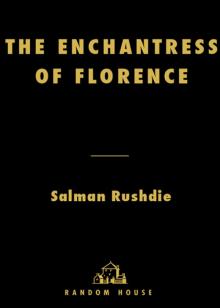 The Enchantress of Florence
The Enchantress of Florence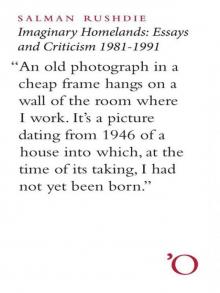 Imaginary Homelands: Essays and Criticism 1981-1991
Imaginary Homelands: Essays and Criticism 1981-1991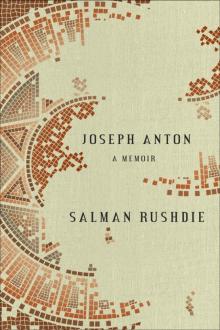 Joseph Anton: A Memoir
Joseph Anton: A Memoir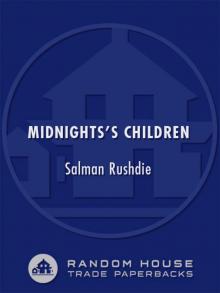 Midnight's Children
Midnight's Children East, West: Stories
East, West: Stories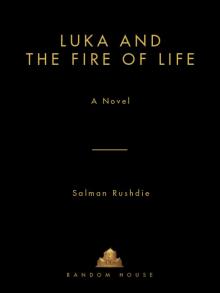 Luka and the Fire of Life
Luka and the Fire of Life Fury Fury Fury
Fury Fury Fury Haroun and the Sea of Stories
Haroun and the Sea of Stories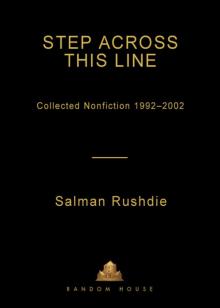 Step Across This Line: Collected Nonfiction 1992-2002
Step Across This Line: Collected Nonfiction 1992-2002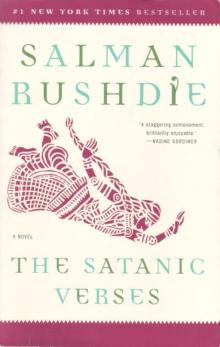 The Satanic Verses
The Satanic Verses The Moor's Last Sigh
The Moor's Last Sigh The Prophet's Hair
The Prophet's Hair The Ground Beneath Her Feet
The Ground Beneath Her Feet Two Years Eight Months and Twenty-Eight Nights
Two Years Eight Months and Twenty-Eight Nights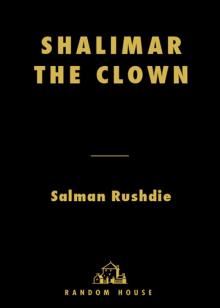 Shalimar the Clown
Shalimar the Clown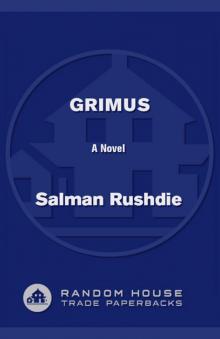 Grimus
Grimus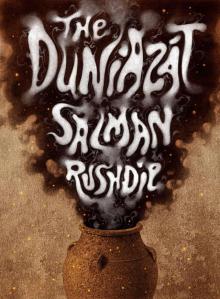 The Duniazát
The Duniazát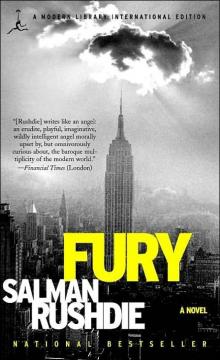 Fury
Fury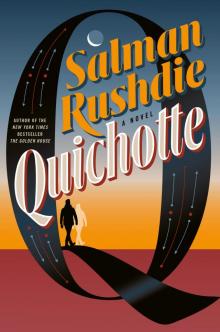 Quichotte
Quichotte The Jaguar Smile
The Jaguar Smile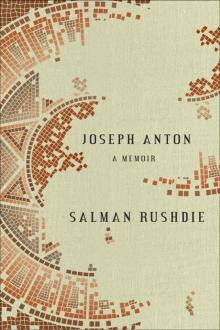 Joseph Anton
Joseph Anton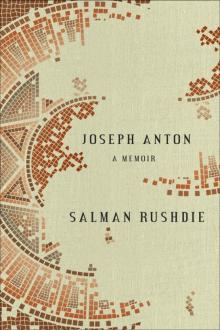 Joseph Anton: A Memoir: A Memoir
Joseph Anton: A Memoir: A Memoir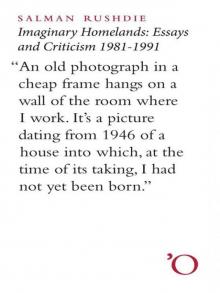 Imaginary Homelands
Imaginary Homelands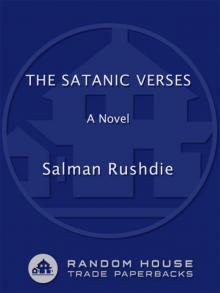 The Satanic Verses: A Novel
The Satanic Verses: A Novel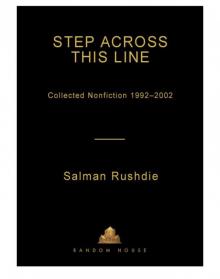 Step Across This Line
Step Across This Line East, West
East, West